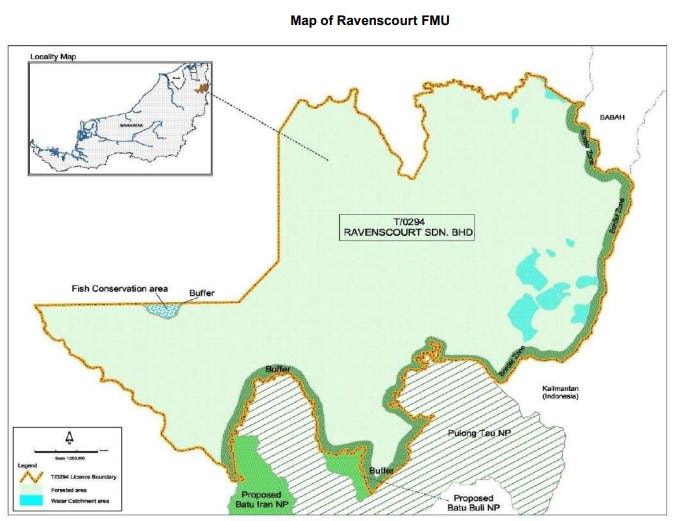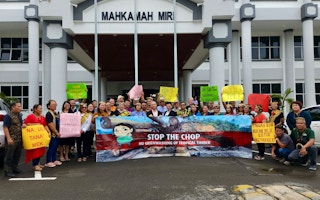Amid international pressure and the loss of one of its forest management certificates, Malaysian timber group Samling has withdrawn its defamation lawsuit against non-profit environmental group Save Rivers.
To continue reading, subscribe to Eco‑Business.
There's something for everyone. We offer a range of subscription plans.
- Access our stories and receive our Insights Weekly newsletter with the free EB Member plan.
- Unlock unlimited access to our content and archive with EB Circle.
- Publish your content with EB Premium.
The first hearing, which had been delayed four times since the suit was first filed two years ago, was meant to be held yesterday at the Miri High Court in Sarawak, Malaysian Borneo. It was cancelled after a last-minute settlement, said environmental and Indigenous rights organisations The Borneo Project and Bruno Manser Fonds in a joint press release.
Samling originally sought RM5 million (US$1.07 million) in damages and an injunction against Save Rivers due to articles on Save Rivers’ website, which alleged that Samling had failed to adequately consult local communities in their management of the Generai Forest Management Unit (FMU) in Sarawak.
However, both parties have reached an amicable resolution, according to a joint statement by both Samling and Save Rivers.
“Both parties to the suit agree that the welfare of the local community remains their priority. Samling welcomes constructive comments and feedback from the local community and will be glad to engage with all relevant stakeholders for the betterment of the local community,” the statement read.
The Gerenai Community Rights Action Committee (GCRAC), a community organisation with representatives from villages that have territories within the Gerenai FMU, celebrated the decision. “Save Rivers and the communities stood and will continue to stand in solidarity with each other,” said Boyce Ngau, vice president of GCRAC in a statement yesterday.
“No one thought that we could win against such a powerful company, but we proved everyone wrong,” he said.
Samling is one of the largest timber companies in Sarawak, with rights to manage three certified natural forest management units in the East Malaysian state spanning some 276,000 hectares.
The case against Save Rivers was categorised as a Strategic Lawsuit against Public Participation (SLAPP) by the United Nations Special Rapporteurs on the Rights of Indigenous Peoples and Human Rights Defenders, and 160 organisations had publicly called for Samling to withdraw the case in April this year.
Forest certificate withdrawn
The settlement of the defamation suit comes after months of increasing local and international pressure against the company, which includes the withdrawal of Samling’s rights to manage another forest management unit, the Ravenscourt FMU and an ongoing investigation by the Forest Stewardship Council (FSC), a sustainable forestry management certifier, into Samling based on a complaint by civil society organisations.
Late last week, it was revealed that the Malaysian Timber Certification Council (MTCC) had withdrawn a forest management certificate awarded to Samling to manage 117,941 hectares of protected forest in Ravenscourt, located in Sarawak’s interior Lawas district. Samling had renewed the licence since 1985, with the latest licence issued up until 2025.

A map of the Ravenscourt Forest Management Unit in Lawas, Sarawak. Image: Sirim Qas International / Public Summary of the Recertification Audit (2021) on Ravenscourt FMU for Forest Management Certification
However, auditor and certifying body Sirim has found that Samling has failed to provide corrective action for several standards violations which were found during a 2021 recertification audit. According to Sirim’s audit, Samling had not adequately consulted local communities in the Ravenscourt unit, not informed them of conflict resolution procedures, and not provided the communities with reports and information, among other standards violations. It also mentioned the omission of indigenous Penan villages, the absence of community use zones on Samling’s maps and the lack of Penan representatives on representative committees.
Which non-conformities and lack of action led to the withdrawal is unclear, said the Borneo Project, which had publicised the withdrawal of the certificate. “There are currently no logging activities on-going in the Ravenscourt forest management unit,” it said in a statement last week.
Penan communities in Ravenscourt welcomed the cancellation of the certificate, having repeatedly opposed logging in the area.
“Samling’s unwillingness to take effective corrective measures to live up to the certification standards shows they are unwilling to comply with the requirements,” said Komeok Joe, chief executive officer of Penan grassroots organisation Keruan. “The Penan will consider any logs extracted from the area to be illegally logged.”
At press time, Samling had not responded to questions from Eco-Business about the loss of the certificate and what their next steps are for the Ravenscourt forest area.
FSC investigates illegal logging
Civil society pressure has also led to an investigation into Samling’s practices by the FSC.
In May, days before Samling’s case against Save Rivers was last scheduled to be heard by Miri courts, FSC said then that it would investigate the company based on a complaint filed last October by a coalition of organisations including The Borneo Project and Save Rivers.
The complaint alleged that Samling had carried out illegal logging, destroyed areas of high conservation value in its forestry operations and significantly converted forests to plantation or non-forest use, in addition to violating traditional and human rights. The FSC said that it is currently exploring whether alternative dispute resolution measures, further investigations or a direct decision may be pursued.
Separately, civil society groups under the Clean Up The Tropical Timber Trade campaign have also protested against Samling’s improved rankings in the Zoological Society of London’s SPOTT rankings, which assess the transparency of environmental and social policies. The campaign, which calls for greater scrutiny by the United Kingdom into tropical timber from Malaysia, is demanding that the assessment of Samling considers field evidence in addition to paper claims of companies. The UK is the world’s third largest importer of certified Malaysian timber after the Netherlands and Japan.
In the meantime, Malaysian and international organisations have welcomed the withdrawal of Samling’s suit against Save Rivers.
Meenakshi Raman, president of Friends of the Earth Malaysia, said that corporations should think twice before filing lawsuits against environmental defenders. “The aim should not be to silence critics but to work towards ensuring that people and the environment are always above profits,” she said.
“Only now Samling is realising how powerful the communities are, they take their power from their long presence in their territory,” said Giovanni Reyes, chair of the Global Environmental Facility’s Indigenous Peoples Advisory Group. Having travelled to Miri to attend the hearing, Reyes said he had been confident Samling would not win its case against Save Rivers and local communities.
Jenny Weber, campaign manager at Australian forest protection organisation the Bob Brown Foundation, was also in Miri to observe the now-cancelled trial. “The world has been watching while a Sarawak logging company has attempted to silence SAVE Rivers. It has not worked.”
“Indigenous-led human rights and environmental defenders can be proud of not backing down and upholding the community’s right to free speech. Sarawak’s forest destruction will continue to face local and global scrutiny and opposition,” said Weber.

















